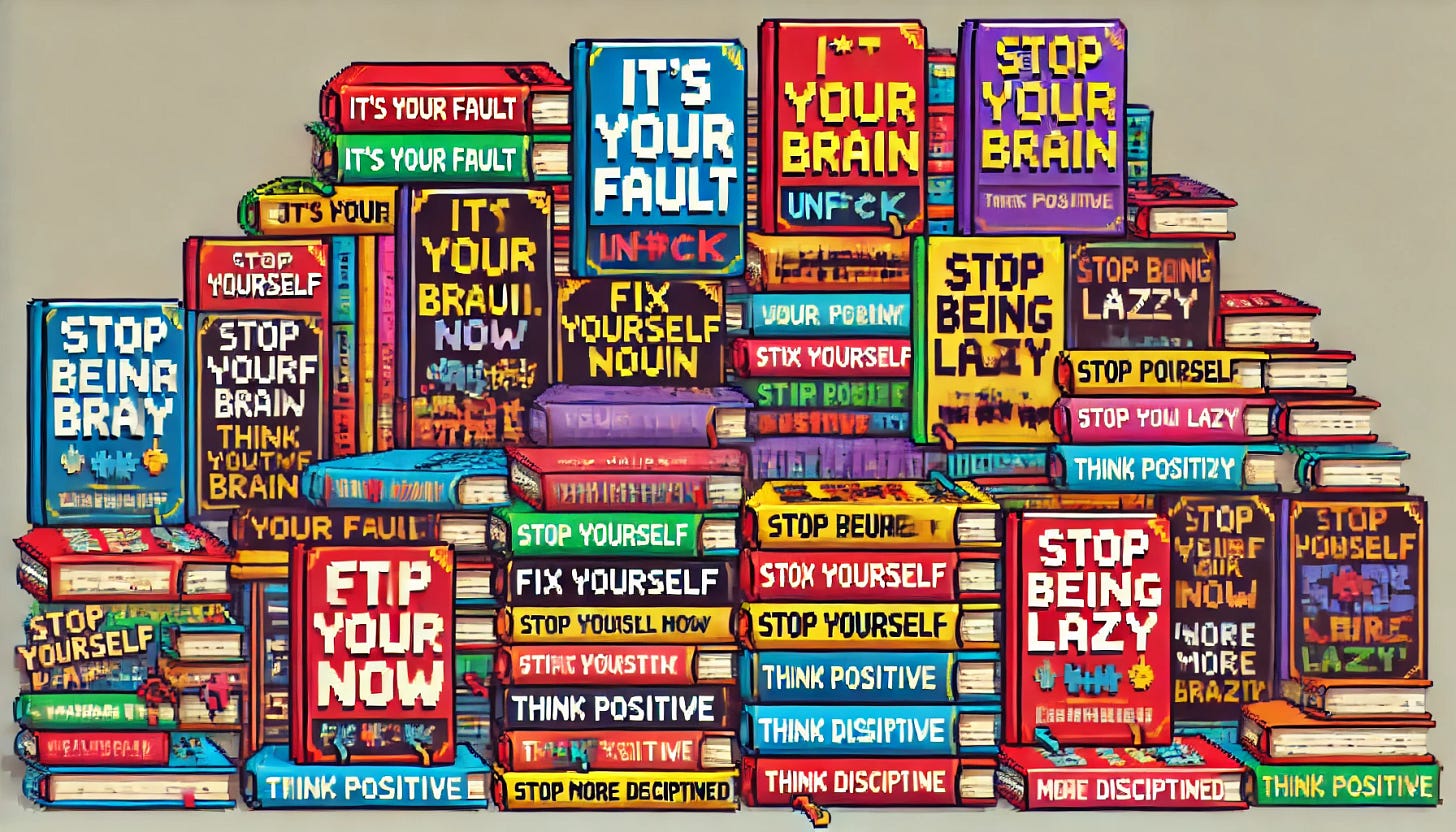The Hidden Harm in Self-Help
How Traditional Frameworks Fail Neurodivergent Individuals
Books like Atomic Habits emphasize the power of small, incremental habit formation. While this approach can help many people build discipline, it often backfires for neurodivergent individuals who struggle with executive dysfunction, motivation, and consistency.
For someone with ADHD or autism, maintaining even simple habits may be an ongoing challenge, leading to damaging self-talk:
“I’m lazy because I can’t stick to basic routines,” or
“If I fail to maintain this habit streak, I’ve ruined my chance at success.”
Frameworks like Atomic Habits assume success is primarily a matter of discipline and willpower, neglecting neurological factors that make habit formation far more complex for some. This can feed into a perfectionist mindset, where any deviation from an ideal routine becomes a source of self-blame and guilt. Neurodivergent individuals may find themselves stuck in a cycle of trying and failing, further reinforcing feelings of inadequacy.
We can help neurodivergent individuals develop healthier self-talk patterns, grounded in self-acceptance and well-being rather than conformity and self-blame.
Emotional Suppression
Mark Manson’s The Subtle Art of Not Giving a Fck encourages readers to focus only on what truly matters and detach from emotional investment in things deemed unimportant. While this advice may resonate with some, it can have harmful effects on neurodivergent individuals, particularly those who already struggle with emotional regulation. For someone on the autism spectrum, this type of advice might push them toward unhealthy self-talk:
“Why am I so sensitive? I should stop caring so much.”
While emotional resilience is important, this approach can lead neurodivergent individuals to suppress or invalidate their authentic emotional experiences. Neurodivergent people often process emotions differently or more intensely than neurotypicals, and encouraging them to detach emotionally can result in long-term burnout and a diminished ability to connect with others.
Hyper-Productivity and Self-Worth
Productivity systems, such as Tiago Forte’s Building a Second Brain or advice from Substack writers like Ali Abdaal, often glorify efficiency and output. For neurodivergent individuals, especially those with ADHD or sensory sensitivities, the pressure to maintain constant productivity can feel overwhelming and unrealistic. Distorted self-talk might include:
“I’m falling behind because I’m not productive enough,” or
“If I just stuck to my schedule better, I’d be more successful.”
These systems often tie self-worth to productivity, which can drive neurodivergent individuals to overwork themselves or feel like failures when they can’t meet neurotypical productivity standards. This relentless pursuit of efficiency neglects the need for rest, sensory regulation, and emotional well-being, leading to exhaustion and burnout.
Blaming Yourself for Challenges
Rhonda Byrne’s The Secret promotes the Law of Attraction—the idea that positive thinking brings positive outcomes, while negative thinking causes problems. For neurodivergent individuals, who may already face systemic barriers, discrimination, or cognitive challenges, this advice can lead to harmful self-blame. Internal dialogue might sound like:
“If I weren’t so negative, everything would be fine,” or
“It’s my fault things are going wrong because I’m not thinking positively enough.”
This kind of advice minimizes the very real external difficulties neurodivergent people encounter, reinforcing internalized ableism. It suggests individuals have total control over their circumstances, which is especially harmful for those who face challenges beyond their control. The result is often deeper frustration and a sense of helplessness when positive thinking doesn’t magically improve their situation.
Masking and “Fixing” Yourself
Mainstream self-improvement often encourages individuals to change or “fix” perceived flaws to better conform to societal norms. For neurodivergent individuals, this can manifest as the harmful belief that they need to mask their true selves to fit in. Autistic individuals, for instance, may think:
“I need to stop acting this way or people will think I’m weird,” or
“If I don’t fit in, it’s my fault for not trying hard enough.”
Masking, or hiding neurodivergent traits to appear more neurotypical, leads to significant emotional exhaustion and mental health struggles. Constantly pretending to be someone else is unsustainable and damaging, reinforcing the belief that being neurodivergent is something to be hidden or fixed in order to be socially acceptable.
The Role of Neurotypical Therapy in Reinforcing Harmful Narratives
In addition to self-help literature, traditional therapy modalities such as Cognitive Behavioral Therapy (CBT) often perpetuate neurotypical ideals. CBT, for instance, focuses on reframing “irrational” thoughts and changing negative thinking patterns. While this approach can be beneficial for some, it can be frustrating for neurodivergent individuals whose thought processes are not irrational but reflect genuine neurological differences. For example, black-and-white thinking is common among autistic individuals, and CBT’s emphasis on changing this thought pattern can feel invalidating rather than supportive.
Therapies that emphasize social conformity—such as making eye contact or engaging in small talk—can further encourage neurodivergent individuals to mask their traits, exacerbating feelings of isolation and exhaustion. Instead of helping neurodivergent individuals embrace their authentic selves, traditional therapy often pushes them to conform to neurotypical standards, perpetuating emotional distress.
Social Temperature: A New Measure of Masking Pressure
For many autistic individuals, navigating social environments often involves a delicate balance between masking and unmasking their true selves. Masking refers to the conscious or unconscious suppression of natural behaviors to align with societal norms, while unmasking allows for authentic self-expression without external pressures.
Moving Toward Neurodiversity-Affirming Approaches
To better serve neurodivergent individuals, self-help frameworks and therapy must evolve toward more inclusive, neurodiversity-affirming models. This means acknowledging cognitive differences and promoting self-acceptance over the pursuit of neurotypical ideals.
Recognizing Unique Challenges
A neurodiversity-affirming approach recognizes that habit formation, emotional regulation, and productivity may look different for neurodivergent individuals. Rather than rigid frameworks that push for perfection or consistency, strategies should emphasize flexibility, compassion, and accommodations for cognitive challenges. Neurodivergent people should be empowered to set their own standards for success, tailored to their specific needs.
Promoting Authenticity
Instead of encouraging masking or the erasure of neurodivergent traits, self-help and therapy should prioritize authenticity. Neurodivergent individuals should feel empowered to embrace their differences without the pressure to conform. This can reduce the emotional burnout caused by masking and foster a greater sense of self-worth and belonging.
Acknowledging Systemic Barriers
Neurodivergent individuals often face external barriers, such as discrimination, inaccessibility, or systemic oppression. Self-help frameworks and therapy must recognize these barriers rather than framing success as solely a matter of mindset or willpower.
By acknowledging the role of external challenges, these frameworks can better support neurodivergent individuals without reinforcing harmful self-blame or internalized ableism.
Capital Fears Autistic Self-Worth
In a world shaped by neoliberal ideologies, the internal lives of autistic individuals—especially those undiagnosed or diagnosed later in life—are often marked by struggles that remain unseen and unacknowledged. Diagnosed with autism at 33, I have encountered firsthand the profound dissonance that arises when navigating a world that measures worth and s…




